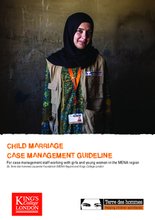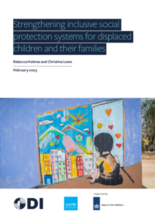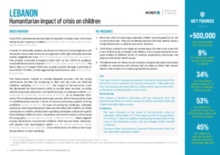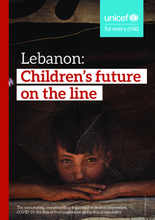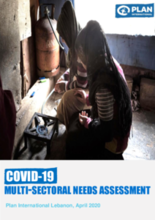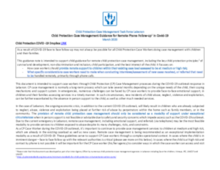Displaying 1 - 10 of 34
Hostilities in southern Lebanon have intensified as a result of the cross-border war between Israel and Gaza. More than 93,000 people have been forced to leave their homes and most children can no longer attend school. The children report severe psychological stress and nightmares, according to the leading Swiss children's rights organisation Terre des hommes Lausanne, which has been providing assistance on the ground for 47 years.
This guidance aims to tailor existing case management standards and guidance to include specific elements that are relevant to child marriage cases; using the voices of Syrian refugee girls from the Terre des hommes-Lausanne Foundation (Tdh) and King’s College London (KCL) research in Lebanon and Jordan to support Child Protection and Gender-Based Violence case management staff in their case management work on the issue of child marriage.
The long-term consequences of COVID-19 have been tough for children around the world, but even more so for young children already in humanitarian crises, whether due to conflict, natural disasters, or economic and political upheaval. Drawing on research and voices from the Global South, this book showcases innovations to mobilize new funds and reallocate existing resources to protect children during the pandemic.
Authored by the ODI in partnership with UNICEF, this paper assesses the benefits of inclusive social protection from a displacement and child-centred perspective.
This report aims to increase awareness of the scale and severity of the economic crisis in Lebanon over the past three years. It describes how the crisis disproportionately affects children and is likely to have short-and long-term consequences on their future.
This rapid assessment from UNICEF explores the devastating, compounding impacts of economic depression, COVID-19, the Beirut Port explosions and political instability on children in Lebanon.
In this webinar, Eva Sammleganage hosts a discussion on adapting family strengthening programs and approaches to COVID-19.
In this episode of the Protected! Podcast, Elissa Alhassrouny, a child protection specialist with Plan International Lebanon, discusses how their team moved to remote child protection programming and the steps involved in that process.
This report presents insightful findings on the effects of the COVID-19 outbreak in Lebanon, highlighting data collected on COVID-19 knowledge, health, WASH, protection, education, food security and livelihoods, shelter, movement and digital access.
This guidance note is intended to support child guidance for remote child protection case management, including the key child protection principles of survival and development, non-discrimination and inclusion, child participation, and the best interest of the child.

